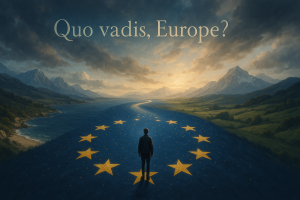‟ World peace cannot be safeguarded without the making of creative efforts proportionate to the dangers which threaten it.”
With these visionary words, French Foreign Minister Robert Schuman opened his historic declaration on 9 May 1950. He proposed the bold idea that European nations should pool their sovereignty over coal and steel production to make war “not merely unthinkable, but materially impossible.” His vision, outlined in the Schuman Declaration, planted the seeds of today’s European Union.
The rule of law: Europe’s cornerstone
75 years on, Europe is reflecting not just on the peace and unity achieved, but on the principles that have sustained them, above all, the rule of law: the idea that law, not arbitrary power, governs public life.
In the European Union, the rule of law is the foundation of mutual trust: between Member States, between institutions, and between citizens.
It sustains judicial cooperation, market integration, and the free movement of persons across borders.
Without it, the very fabric of European cooperation would begin to fracture.
Today, however, the rule of law is faced with growing challenges:
- Judicial independence has been questioned in parts of Europe, undermining legal certainty.
- Fundamental rights have clashed with political pressures at national levels.
- Digital platforms have complicated the enforcement of common standards.
- Geopolitical tensions have strained the Union’s external credibility as a guardian of democracy and legal order.
At the Luxembourg Centre for European Law (LCEL), that anniversary posed an obvious but urgent question:
Quo vadis, Europe?
What’s at stake for the rule of law?
Evolving competences and democratic legitimacy
“When reflecting on the rule of law within the EU two aspects that are not so much connected to the rule, but rather to the law, might be worth considering for it to continue its role ‘as the backbone of the European project’. These concern the content of EU law and the democratic legitimisation of it.
Important for the content of the law that the EU enacts are its competencies. This raises the question which competencies the EU should have to enact the laws it needs to reach its objectives. What should these objectives in the future be? A reflection on the content of EU law leads to rethinking the objectives of the EU. Part of rethinking the objectives of the EU is that its organisational structure needs to contribute to achieving those objectives. Thus, the reflection on the role of the rule of law within the EU seems to be connected to the fundamental debate on how the EU should be structured as an organisation and which competencies it should have to achieve its objectives.
Part of this organisational structure is the democratic legitimisation of EU law. Proper institutions need to be in place to base EU law on the support of those to whom the law applies. For a useful reflection on the rule of law it is perhaps also important to reflect on the democratic legitimisation of EU law.”
Institutional preservation and the contestation of values
“The rule of law underpins the European Union and European law as a constitutional principle, a political value, and a governance tool.
For the European project, the rule of law has traditionally focused on judicial protection and the protection of fundamental rights. Though EU law’s understanding of the rule of law has by no means been purely procedural, it has heavily relied on the correct functioning of the EU institutional order. The Court of Justice of the European Union has developed a constitutional paradigm whereby its own role in judicial review and its dialogue with national courts serve as primary guarantees to the rule of law in Europe.
The preservation of the above institutional features of the EU legal order therefore is an existential objective, binding the EU and member states alike. However, the more demanding challenge is for Europe to address the contestation of the rule of law and associated principles -including democracy- as substantive values.
This is not merely a risk with regard to certain EU member states. The EU is also bound to uphold and promote the rule of law in its external relations with third states, international organisations and other international actors.
This is difficult to achieve at a time of increasing divergence of values globally. In these circumstances, upholding the rule of law cannot be exhausted to a reiteration of core domestic constitutional prerogatives. Rather, Europe is required to also demonstrate (geo)political agility based on clear red lines and an honest assessment of necessary trade-offs.”
The digital rule of law
-

Lorenzo Gradoni
“In recent years, the European Union has positioned itself as a global standard-setter in the digital sphere. Through landmark legislation such as the Digital Services Act (DSA), the EU is shaping how digital platforms operate, how data is handled, and how fundamental rights are protected online. In an increasingly unstable global context – marked by geopolitical tensions and the growing power of digital corporations as mediators of public discourse – the EU aims to defend not only user rights and safety, but the integrity of the democratic process itself. Lately, major tech corporations are pushing back against these efforts, testing the EU’s resolve and institutional capacity to uphold the rule of law. In this evolving landscape, Luxembourg plays a vital role as the seat of the Court of Justice of the European Union. The Court’s decisions will shape the interpretation and application of digital regulation, affirming – or undermining – Europe’s ability to uphold its constitutional values. Where Europe goes next in this domain will help define the rule of law in the 21st century.”
Sustainability, human rights, and legal integrity
“The European Green Deal and the Corporate Sustainability Due Diligence Directive (CSDDD) are not only environmental and social initiatives, they are also profound legal projects that reflect how Europe envisions the future of the rule of law in light of sustainable ambitions. They signal a shift from voluntary corporate responsibility to enforceable obligations regarding sustainable and human rights goals, anchored in legal certainty and institutional accountability.
But this vision is under pressure. The political compromises reached in recent months have weakened core aspects of the CSDDD, exposing the fragility of consensus within the EU. At the same time, external forces, from deregulatory trends in the U.S. to broader geopolitical shifts, are testing the EU’s ability to uphold and sustain its legal principles.
What’s at stake is Europe’s commitment to a rule of law that is proactive, cross-border, and rights-based, towards sustainable goals. The EU’s legal order gains legitimacy when it protects not only internal markets but also human dignity and environmental integrity across value chains. As backlash mounts, Europe must decide: will it step back in the face of resistance, or enhance its positions towards a vision of law that shapes globalisation through justice?
The answer will define the credibility of Europe’s legal project in the decades to come.“
The rule of law in cross-border civil justice
“Judicial cooperation in civil and commercial matters aims at guaranteeing the citizens an easy and effective access to justice in cross-border disputes, especially by ensuring the mutual recognition and enforcement of the national decisions settling said disputes. Respect for the rule of law is key to achieve such goal. Mutual recognition depends on mutual trust, which, in turn, relies on the assumption that a comparable understanding and comparable guarantees are present in all the Member States as regards the rule of law and democracy. Breaches of the rule of rule translate thus into situations where the principle of mutual recognition cannot apply, judicial cooperation does not take place, the free circulation of judgments fails, and the functioning of the whole internal market is at risk.
The doubts about the judicial independence in certain Member States have weakened mutual trust also in relation to cooperation in civil matters. Member State where enforcement is sought may rely on the public-policy clause laid down in the EU regulations on PIL and deny the recognition of judgments rendered in a context of systemic deficiencies of the judiciary, when the individual right to a due process has been breached. In a similar vein, the public-policy exception allows rejecting a foreign judgment which on the merits, or as a consequence of its enforcement, would infringe the rights and freedoms enshrined in Article 11 of the Charter; the same goes for the application of a foreign law. While it may be posited that, in this way, Member States protect the rule of law in their territory and help detecting States which may not be doing so in theirs, the use of the ‘escape device’ is, per definition, not a solution but the acknowledgment of a problem. The challenge for the years to come is, therefore, to come back to the conditions where resort to the public-policy clause remains restricted and exceptional, as it was always meant to be.”
The CJEU and the boundaries of legal intervention
“More than a decade of rule of law and democratic backsliding in some of the Member States of the European Union have led to Court of Justice to develop the standards of judicial independence and to weigh in on the competence of the Member States of organising their judiciaries. It has developed an important role in safeguarding judicial independence – often prompted by preliminary references from courts whose independence was being imperiled nationally – on newly found legal grounds. These were inexistent prior to the connection the Court made between Art. 2 TEU (values), Article 47 of the Charter of Fundamental Rights (right to an effective judicial remedy) and Article 19(1) TEU (effective judicial protection before national courts). Above all, the Court sought a European legal solution to a distinctively national political problem, and prompted one battle front – judicial independence – to the detriment of others, where EU values are equally at stake. This has been and will continue to be a very unsteady path to tread. On the one hand, the Court may be praised for having acted where the political mechanisms to counter authoritarianism were wanting (both at the national and at the EU level). On the other, legal dicta can hardly counter the political turn that is spreading in various Member States. They can weaken the law and backlash politically.”
Judicial resilience
“The rule of law in Europe is the backbone of our societies. It ensures that everyone, citizens and all public institutions, abide by the same law. It is what makes justice effective, democracy possible, and equality tangible. However, the rule of law in Europe is facing many challenges. Some EU countries have weaker judicial systems. At the same time, disinformation threatens media freedom and access to quality information, especially on digital and social platforms. Besides, geopolitical tensions create instability and uncertainty, making it harder to safeguard peace.
In this context, the Court of Justice of the EU plays a vital role. As a mission, the Court makes EU law and the rule of law effective all across Europe. To successfully address all incoming challenges, the Court’s procedures and functioning must be adapted to enhance openness, efficiency and resilience. This would enable the Court to manage arising complexities, including scientific, technological, and sensitive societal matters. Increasing cases involving strategic litigation – where collective interests are involved – show the importance of judicial adaptability. How the Court addresses such cases will shape its trajectory and determine the future of the rule of law across Europe.”
Quo vadis, Europe?
75 years after Robert Schuman’s declaration, the European Union stands as a community of law. The rule of law remains a living principle: shaped by institutions, tested by new realities, and sustained by political and societal commitment.
The question remains: Quo vadis, Europe?
The answer lies not just in words, but in the collective actions that will define Europe’s future.






